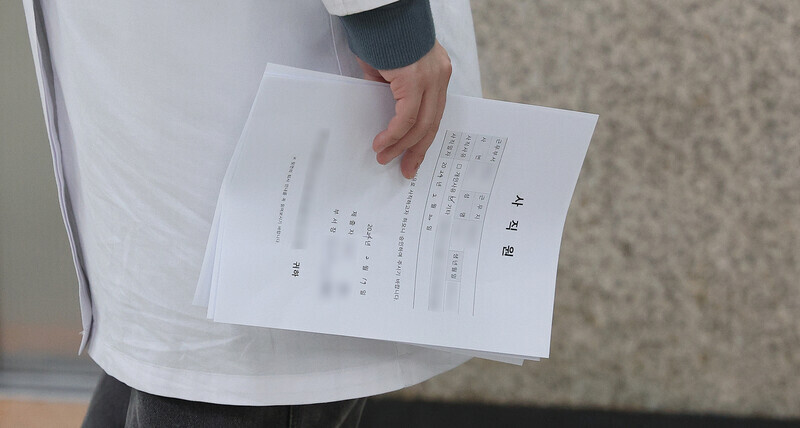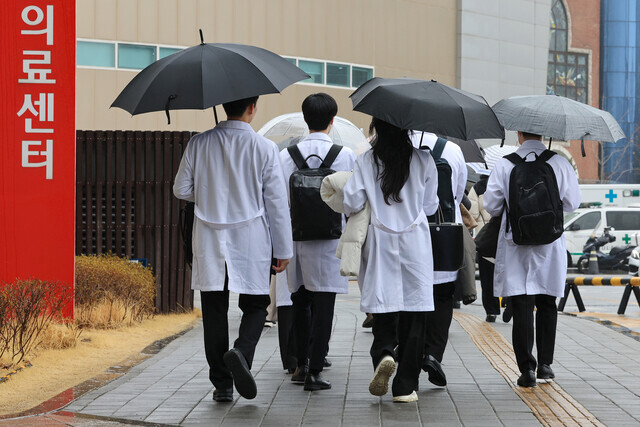hankyoreh
Links to other country sites 다른 나라 사이트 링크
As anxieties mount, Korea threatens to suspend licenses of doctors behind collective action

Fears of a medical care vacuum are being borne out as interns and residents at Korean hospitals resign en masse in protest of the government’s policy to increase the number of medical students nationwide. The government has responded by sending two executive members of the Korean Medical Association (KMA) written notices that their medical licenses will be suspended.
The government is also expected to order interns and residents to continue treating patients while utilizing public hospitals to fill the gaps left by the mass resignations. Civic groups are criticizing doctors for holding patients hostage in their negotiations with the government.
According to statements from the Ministry of Health and Welfare compiled on Monday, the number of hospital beds at the emergency room at Severance Hospital in Seoul’s Seodaemun District has diminished, while the number of scheduled surgeries has been reduced by half. Interns and residents have collectively resigned, irrespective of whether the treatments they were performing were essential — as in life-saving — or non-essential, as in routine.
Not a single intern or resident is left in the cardiology department, meaning there is simply no way to continue treatments or surgeries as scheduled.
“Emergency surgeries [at hospitals in Sinchon and Gangnam] are being conducted as normal, but surgeries in other departments are under 50% capacity,” said a Severance Hospital insider.
Severance Hospital conducts an average of 200 surgeries per day. The National Cancer Center has also delayed surgeries due to a lack of anesthesiology residents, who are essential for surgeries. Residents at Seoul National University Hospital, the Samsung Medical Center, St. Mary’s Hospital in Seoul, and Asan Medical Center are also expected to resign en masse, which will make the medical vacuum even larger.
Naturally, this will only add to anxieties currently on the rise among those currently seeking medical care.
“All around the ward, patients and their families are talking about surgeries being delayed,” said Lee Jin-wook, 52, who is scheduled to undergo brain surgery at Severance Hospital’s Sinchon location.
“It looks like they’re pushing back all non-essential operations.”

The government has responded by underscoring they would not tolerate doctors refusing to treat their patients, with President Yoon Suk-yeol reportedly saying that the medical community “will not win a battle with the public.” Yoon apparently gave this response when his aides reported that Noh Hwan-kyu, a former KMA chairman, declared, “The government will not win a battle with doctors.”
The Health Ministry has declared that the house staff in question have violated the government’s order prohibiting their mass resignation, and has issued an administrative order suspending the medical license of Kim Taek-woo, the chairman of the KMA emergency committee. The ministry is expected to issue its final orders regarding the matter by March 4, after negotiating with the health care providers.
The ministry has also issued an administrative order for doctors to continue treatments. It essentially prohibits mass resignations or extended leaves of absence that prevent scheduled treatments. Article 59 of the Medical Service Act allows the health minister, city mayors, and provincial governors to order medical personnel to continue working if a cessation in treatments constitutes a grave public health threat. A violation of the order could result in a doctor’s medical license being suspended for up to a year.
“We are considering measures that involve cooperating with prosecutors to indict and arrest the leaders of the medical community who are responsible for the mass resignations,” said Yoon Hee-keun, the commissioner general of the Korean National Police Agency, during a press conference.
Meanwhile, the Justice Ministry announced that it ordered the Supreme Prosecutors’ Office to “respond resolutely and strictly in accordance with the law when it comes to illegal collective actions that threaten public health and safety.”
The government has also announced emergency measures to fill the medical vacuum. Prime Minister Han Duck-soo announced that he presided over a meeting of the relevant ministers regarding the collective actions of doctors at the central government complex in Seoul. The response measures involve moving non-critically ill patients to other nearby hospitals to prevent overcrowding at certain hospitals. The government also plans to extend the operation hours of public hospitals and utilize medical personnel in the provinces and rural areas.
Civic society is also levying heavy criticism on the residents and interns who are tendering their resignations. A collective movement involving groups like People’s Solidarity for Participatory Democracy and the Korean Health and Medical Workers' Union released a statement denouncing the mass resignations, claiming, “Any doctor or medical professional with a sense of ethics should realize that the residents and interns should not leave their posts.”
The Citizens' Coalition for Economic Justice has threatened to “report any doctors that break the law and threaten the health of the public to the Korean Fair Trade Commission.” The move is based on allegations that the mass resignations violate South Korea’s fair trade regulations.
By Cheon Ho-sung, staff reporter; Kim Yoon-ju, staff reporter; Oh Yeon-seo, staff reporter
Please direct questions or comments to [english@hani.co.kr]

Editorial・opinion
![[Editorial] Perilous stakes of Trump’s rhetoric around US troop pullout from Korea [Editorial] Perilous stakes of Trump’s rhetoric around US troop pullout from Korea](https://flexible.img.hani.co.kr/flexible/normal/500/300/imgdb/original/2024/0509/221715238827911.jpg) [Editorial] Perilous stakes of Trump’s rhetoric around US troop pullout from Korea
[Editorial] Perilous stakes of Trump’s rhetoric around US troop pullout from Korea![[Guest essay] Preventing Korean Peninsula from becoming front line of new cold war [Guest essay] Preventing Korean Peninsula from becoming front line of new cold war](https://flexible.img.hani.co.kr/flexible/normal/500/300/imgdb/original/2024/0507/7217150679227807.jpg) [Guest essay] Preventing Korean Peninsula from becoming front line of new cold war
[Guest essay] Preventing Korean Peninsula from becoming front line of new cold war- [Column] The state is back — but is it in business?
- [Column] Life on our Trisolaris
- [Editorial] Penalties for airing allegations against Korea’s first lady endanger free press
- [Editorial] Yoon must halt procurement of SM-3 interceptor missiles
- [Guest essay] Maybe Korea’s rapid population decline is an opportunity, not a crisis
- [Column] Can Yoon steer diplomacy with Russia, China back on track?
- [Column] Season 2 of special prosecutor probe may be coming to Korea soon
- [Column] Park Geun-hye déjà vu in Yoon Suk-yeol
Most viewed articles
- 1[Editorial] Perilous stakes of Trump’s rhetoric around US troop pullout from Korea
- 2‘Free Palestine!’: Anti-war protest wave comes to Korean campuses
- 3Behind-the-times gender change regulations leave trans Koreans in the lurch
- 4Nuclear South Korea? The hidden implication of hints at US troop withdrawal
- 5[Photo] ‘End the genocide in Gaza’: Students in Korea join global anti-war protest wave
- 6Korean president’s jailed mother-in-law approved for parole
- 7In Yoon’s Korea, a government ‘of, by and for prosecutors,’ says civic group
- 8With Naver’s inside director at Line gone, buyout negotiations appear to be well underway
- 960% of young Koreans see no need to have kids after marriage
- 10Yoon’s revival of civil affairs senior secretary criticized as shield against judicial scrutiny